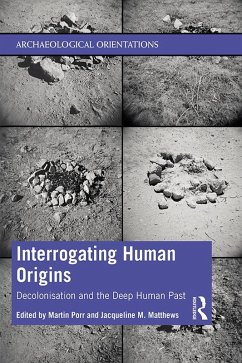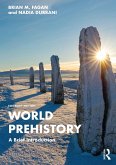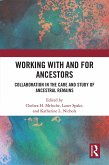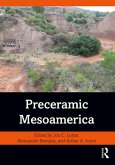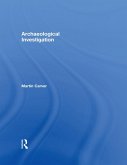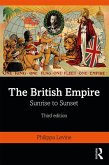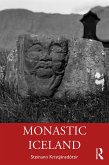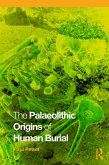Interrogating Human Origins (eBook, PDF)
Decolonisation and the Deep Human Past
Redaktion: Porr, Martin; Matthews, Jacqueline
39,95 €
39,95 €
inkl. MwSt.
Sofort per Download lieferbar

20 °P sammeln
39,95 €
Als Download kaufen

39,95 €
inkl. MwSt.
Sofort per Download lieferbar

20 °P sammeln
Jetzt verschenken
Alle Infos zum eBook verschenken
39,95 €
inkl. MwSt.
Sofort per Download lieferbar
Alle Infos zum eBook verschenken

20 °P sammeln
Interrogating Human Origins (eBook, PDF)
Decolonisation and the Deep Human Past
Redaktion: Porr, Martin; Matthews, Jacqueline
- Format: PDF
- Merkliste
- Auf die Merkliste
- Bewerten Bewerten
- Teilen
- Produkt teilen
- Produkterinnerung
- Produkterinnerung

Bitte loggen Sie sich zunächst in Ihr Kundenkonto ein oder registrieren Sie sich bei
bücher.de, um das eBook-Abo tolino select nutzen zu können.
Hier können Sie sich einloggen
Hier können Sie sich einloggen
Sie sind bereits eingeloggt. Klicken Sie auf 2. tolino select Abo, um fortzufahren.

Bitte loggen Sie sich zunächst in Ihr Kundenkonto ein oder registrieren Sie sich bei bücher.de, um das eBook-Abo tolino select nutzen zu können.
Interrogating Human Origins encourages new critical engagements with the study of human origins, broadening the range of approaches to bring in postcolonial theories, and beginning to explore the decolonisation of this complex topic.
- Geräte: PC
- ohne Kopierschutz
- eBook Hilfe
- Größe: 49.98MB
Andere Kunden interessierten sich auch für
![World Prehistory (eBook, PDF) World Prehistory (eBook, PDF)]() Brian M. FaganWorld Prehistory (eBook, PDF)80,95 €
Brian M. FaganWorld Prehistory (eBook, PDF)80,95 €![Working with and for Ancestors (eBook, PDF) Working with and for Ancestors (eBook, PDF)]() Working with and for Ancestors (eBook, PDF)42,95 €
Working with and for Ancestors (eBook, PDF)42,95 €![Preceramic Mesoamerica (eBook, PDF) Preceramic Mesoamerica (eBook, PDF)]() Preceramic Mesoamerica (eBook, PDF)38,95 €
Preceramic Mesoamerica (eBook, PDF)38,95 €![Archaeological Investigation (eBook, PDF) Archaeological Investigation (eBook, PDF)]() Martin CarverArchaeological Investigation (eBook, PDF)46,95 €
Martin CarverArchaeological Investigation (eBook, PDF)46,95 €![The British Empire (eBook, PDF) The British Empire (eBook, PDF)]() Philippa LevineThe British Empire (eBook, PDF)42,95 €
Philippa LevineThe British Empire (eBook, PDF)42,95 €![Monastic Iceland (eBook, PDF) Monastic Iceland (eBook, PDF)]() Steinunn KristjánsdóttirMonastic Iceland (eBook, PDF)37,95 €
Steinunn KristjánsdóttirMonastic Iceland (eBook, PDF)37,95 €![The Palaeolithic Origins of Human Burial (eBook, PDF) The Palaeolithic Origins of Human Burial (eBook, PDF)]() Paul PettittThe Palaeolithic Origins of Human Burial (eBook, PDF)39,95 €
Paul PettittThe Palaeolithic Origins of Human Burial (eBook, PDF)39,95 €-
-
-
Interrogating Human Origins encourages new critical engagements with the study of human origins, broadening the range of approaches to bring in postcolonial theories, and beginning to explore the decolonisation of this complex topic.
Dieser Download kann aus rechtlichen Gründen nur mit Rechnungsadresse in A, B, BG, CY, CZ, D, DK, EW, E, FIN, F, GR, HR, H, IRL, I, LT, L, LR, M, NL, PL, P, R, S, SLO, SK ausgeliefert werden.
Produktdetails
- Produktdetails
- Verlag: Taylor & Francis eBooks
- Seitenzahl: 366
- Erscheinungstermin: 6. Dezember 2019
- Englisch
- ISBN-13: 9781000761610
- Artikelnr.: 58391720
- Verlag: Taylor & Francis eBooks
- Seitenzahl: 366
- Erscheinungstermin: 6. Dezember 2019
- Englisch
- ISBN-13: 9781000761610
- Artikelnr.: 58391720
- Herstellerkennzeichnung Die Herstellerinformationen sind derzeit nicht verfügbar.
Jacqueline M Matthews is a professional archaeologist with Cultural Heritage Management Australia and has wide-ranging experience working with Indigenous communities across Australia. She completed her Masters thesis at University of Western Australia focused on the application of ontological and postcolonial theories to Australian archaeology, which lead to a research interest in the role of Australia in global debates about human origins. Martin Porr is Associate Professor of Archaeology and a member of the Centre for Rock Art Research + Management at the University of Western Australia (UWA). His research has so far concentrated on aspects related to Palaeolithic European art, Australian rock art, human origins and postcolonial approaches towards archaeological research. He has conducted fieldwork in Germany, Thailand, Australia, India and the Philippines.
Section 1: Introduction; Chapter 1 Interrogating and decolonising the deep
human past; Section 2: Definition of the human and its colonial legacy;
Chapter 2 IMHO: inventing modern human origins; Chapter 3 Modern ontologies
of the 'more-than-animal' human: provincialising humanism for the present
day; Chapter 4 Colonialism and narratives of human origins in Asia and
Africa; Chapter 5 Primordialising Aboriginal Australians: colonialist
tropes and Eurocentric views on behavioural markers of modern humans;
Section 3: Representation, temporality and narratives of human origins;
Chapter 6 Old Flames: rekindling ideas of fire, humanity and representation
through creative art practice; Chapter 7 Orientalism and origins: the
search for firsts in the 'Cradle of Civilization'; Chapter 8 The Beast
Without. Becoming human in the science fiction of H.G. Wells; Chapter 9 The
temporality of humanity and the colonial landscape of the deep human past;
Section 4: National, political and historical dimensions of human origins;
Chapter 10 The Far West from the Far East: decolonisation and human origins
in East Asia: the legacy of 1937 and 1948; Chapter 11 Interpretative shifts
in understanding the prehistoric settlement of the Indian Subcontinent:
comparing Western and Indian historical perspectives; Chapter 12 Our
earliest ancestors: human and non-human primates of North America; Chapter
13 "If we are all African, then I am nothing", hominin evolution and the
politics of identity in South Africa; Section 5: The construction of
genetic facts; Chapter 14 Naming the sacred ancestors: taxonomic
reification and Pleistocene genomic narratives; Chapter 15 Traditional
owner participation in genetic research: a researcher perspective
human past; Section 2: Definition of the human and its colonial legacy;
Chapter 2 IMHO: inventing modern human origins; Chapter 3 Modern ontologies
of the 'more-than-animal' human: provincialising humanism for the present
day; Chapter 4 Colonialism and narratives of human origins in Asia and
Africa; Chapter 5 Primordialising Aboriginal Australians: colonialist
tropes and Eurocentric views on behavioural markers of modern humans;
Section 3: Representation, temporality and narratives of human origins;
Chapter 6 Old Flames: rekindling ideas of fire, humanity and representation
through creative art practice; Chapter 7 Orientalism and origins: the
search for firsts in the 'Cradle of Civilization'; Chapter 8 The Beast
Without. Becoming human in the science fiction of H.G. Wells; Chapter 9 The
temporality of humanity and the colonial landscape of the deep human past;
Section 4: National, political and historical dimensions of human origins;
Chapter 10 The Far West from the Far East: decolonisation and human origins
in East Asia: the legacy of 1937 and 1948; Chapter 11 Interpretative shifts
in understanding the prehistoric settlement of the Indian Subcontinent:
comparing Western and Indian historical perspectives; Chapter 12 Our
earliest ancestors: human and non-human primates of North America; Chapter
13 "If we are all African, then I am nothing", hominin evolution and the
politics of identity in South Africa; Section 5: The construction of
genetic facts; Chapter 14 Naming the sacred ancestors: taxonomic
reification and Pleistocene genomic narratives; Chapter 15 Traditional
owner participation in genetic research: a researcher perspective
Section 1: Introduction; Chapter 1 Interrogating and decolonising the deep
human past; Section 2: Definition of the human and its colonial legacy;
Chapter 2 IMHO: inventing modern human origins; Chapter 3 Modern ontologies
of the 'more-than-animal' human: provincialising humanism for the present
day; Chapter 4 Colonialism and narratives of human origins in Asia and
Africa; Chapter 5 Primordialising Aboriginal Australians: colonialist
tropes and Eurocentric views on behavioural markers of modern humans;
Section 3: Representation, temporality and narratives of human origins;
Chapter 6 Old Flames: rekindling ideas of fire, humanity and representation
through creative art practice; Chapter 7 Orientalism and origins: the
search for firsts in the 'Cradle of Civilization'; Chapter 8 The Beast
Without. Becoming human in the science fiction of H.G. Wells; Chapter 9 The
temporality of humanity and the colonial landscape of the deep human past;
Section 4: National, political and historical dimensions of human origins;
Chapter 10 The Far West from the Far East: decolonisation and human origins
in East Asia: the legacy of 1937 and 1948; Chapter 11 Interpretative shifts
in understanding the prehistoric settlement of the Indian Subcontinent:
comparing Western and Indian historical perspectives; Chapter 12 Our
earliest ancestors: human and non-human primates of North America; Chapter
13 "If we are all African, then I am nothing", hominin evolution and the
politics of identity in South Africa; Section 5: The construction of
genetic facts; Chapter 14 Naming the sacred ancestors: taxonomic
reification and Pleistocene genomic narratives; Chapter 15 Traditional
owner participation in genetic research: a researcher perspective
human past; Section 2: Definition of the human and its colonial legacy;
Chapter 2 IMHO: inventing modern human origins; Chapter 3 Modern ontologies
of the 'more-than-animal' human: provincialising humanism for the present
day; Chapter 4 Colonialism and narratives of human origins in Asia and
Africa; Chapter 5 Primordialising Aboriginal Australians: colonialist
tropes and Eurocentric views on behavioural markers of modern humans;
Section 3: Representation, temporality and narratives of human origins;
Chapter 6 Old Flames: rekindling ideas of fire, humanity and representation
through creative art practice; Chapter 7 Orientalism and origins: the
search for firsts in the 'Cradle of Civilization'; Chapter 8 The Beast
Without. Becoming human in the science fiction of H.G. Wells; Chapter 9 The
temporality of humanity and the colonial landscape of the deep human past;
Section 4: National, political and historical dimensions of human origins;
Chapter 10 The Far West from the Far East: decolonisation and human origins
in East Asia: the legacy of 1937 and 1948; Chapter 11 Interpretative shifts
in understanding the prehistoric settlement of the Indian Subcontinent:
comparing Western and Indian historical perspectives; Chapter 12 Our
earliest ancestors: human and non-human primates of North America; Chapter
13 "If we are all African, then I am nothing", hominin evolution and the
politics of identity in South Africa; Section 5: The construction of
genetic facts; Chapter 14 Naming the sacred ancestors: taxonomic
reification and Pleistocene genomic narratives; Chapter 15 Traditional
owner participation in genetic research: a researcher perspective
